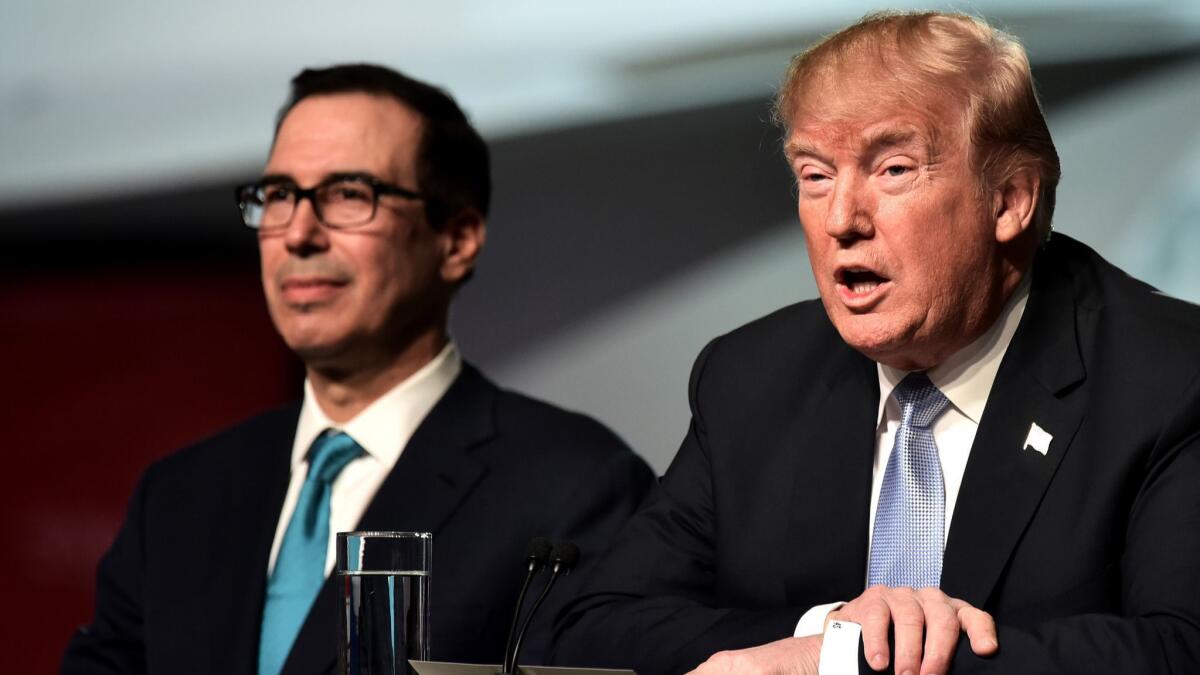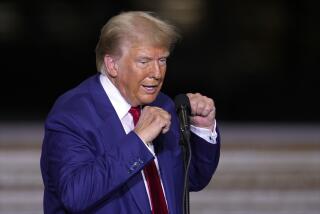Op-Ed: The law is clear on disclosing Trump’s tax returns to the House Ways and Means Committee

The battle for access to President Trump’s tax returns has officially been joined. Richard Neal (D-Mass.), chairman of the House Ways and Means Committee, has requested from the IRS commissioner six years of tax returns for Trump and eight of his companies. The deadline for responding is Wednesday.
Trump’s advisors have made it clear that the request will be denied. Acting Chief of Staff Mick Mulvaney said that the tax returns will “never” be turned over. The ensuing struggle could lead to a novel and dangerous constitutional crisis.
The relevant law here is neither obscure nor unclear. If most citizens were previously unaware of tax code section 6103, that’s because they’ve not been in a position to invoke it. But for those to whom it is relevant — law enforcement agencies, state tax authorities, committees of Congress, and others — it is straightforward.
A request motivated only by Neal’s idle curiosity could, perhaps, be resisted.
The statute permits the chairman of the House Ways and Means Committee to request any tax return, provided — and this is important — he ensures the privacy of the return. The entire committee, for example, can access a return only when meeting in private (“executive”) session. An unauthorized public release is a felony. Chairman Neal is not looking to collect the Trump tax returns simply so he can publish them on the committee’s website.
A request motivated only by Neal’s idle curiosity could, perhaps, be resisted. But Neal’s request plainly relates to his committee’s oversight of the IRS, and in particular whether the IRS is following its own procedures in auditing the president’s returns. Given the tremendous pressure that an IRS agent might feel when reviewing a president’s tax situation, this oversight is urgently required. Because the president insists that his pre-election returns are still under audit, the oversight must extend to them as well.
Trump’s lawyer, Jay Sekulow, appearing on ABC’s “This Week,” pointed out that the Supreme Court has held that congressional oversight cannot become law enforcement. He’s right — but he is advancing a red herring. The IRS alone enforces the tax law, assessing and collecting taxes due from any taxpayer. Neal’s possession of Trump’s tax returns would not change that.
The only thorny legal question arises if the full Ways and Means Committee, after debate and a vote in executive session, were to authorize the dissemination of Trump’s tax return into the public record of the House of Representatives. The tax law expressly permits this second step, but the scope of the committee’s authority here requires a separate legal analysis — a point missed by many commentators.
If the committee votes to publicly release Trump’s tax information, that would expose the inherent tension in the law between the statute’s general presumption of taxpayer privacy and its simultaneous grant of power to the Ways and Means Committee to forward tax return information to the whole House.
In my view, forwarding tax information to the whole House should require more substantial justification from the chairman than he needed to request Trump’s tax information initially. Two of my predecessors as chief of staff of the Joint Committee on Taxation have come to similar conclusions. At this point, however, the committee has not even received the tax returns — so it’s much too early to handicap the likelihood of future public disclosure.
But if that question does get posed — does the Ways and Means Committee have a solid reason to put Trump’s tax returns in the public House record? — it turns out that the Republicans have poisoned their own well.
The only precedent on such a move stems from 2014. Back then, congressional Republicans were on the warpath, insisting that the IRS improperly discriminated against conservative organizations seeking tax-exempt status.
Enter the Fray: First takes on the news of the minute from L.A. Times Opinion »
The allegations were overstated and largely trumped up. But what’s important here is that the committee, voting on party lines, released into the public record tax return information of more than 50 organizations, for absolutely no reason beyond their hope to embarrass Democrats. If Trump challenges a public release of his tax information in court, he should fear that Republicans’ 2014 political power move could color the outcome.
An even larger constitutional crisis lurks in the background, too. Trump’s lawyers have intimated that if Neal persists, the president might respond by using his own statutory authority (also in section 6103) to request the tax returns of prominent Democrats, like House Speaker Nancy Pelosi — apparently with a view to releasing those returns to the public.
Trump’s lawyers have overlooked the fact that the law permits the president to examine the tax returns of any individual, but it does not allow him to release them. The president’s power simply is narrower under the law than is that of the Ways and Means Committee.
Were Trump to proceed along those lines, he would be guilty of a felony. It is not clear, though, that the Justice Department would prosecute this crass abuse of power. The result would be a downward spiral of tit-for-tat politics and constitutional standoffs in which the American people would be the loser.
Edward Kleinbard, a professor at the USC Gould School of Law, was chief of staff for Congress’s Joint Committee on Taxation from 2007-09.
Follow the Opinion section on Twitter @latimesopinionand Facebook
More to Read
A cure for the common opinion
Get thought-provoking perspectives with our weekly newsletter.
You may occasionally receive promotional content from the Los Angeles Times.










